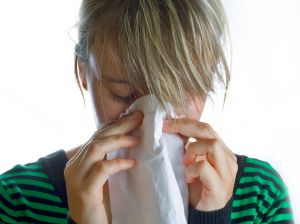By Adam Gower, MD, pediatric pulmonologist, Brenner Children’s Hospital
As a pediatric pulmonologist, I often see patients (and their parents) when they have had their first asthma attack or diagnosed with reactive airway disease. Many parents also contact me when their children struggle with asthma medications and keep having breakthrough “breathing episodes” despite taking medications. I am also the lead investigator on a clinical research trial, sponsored by the National Institutes of Health, which is working to find new treatments for asthma patients. Below are some questions I am commonly asked.
What is asthma? What is reactive airways disease?
Asthma is a chronic disorder in which the air passages in the lungs become inflamed, making it harder for air to move through them. This inflammation can be worsened by triggers, such as viral infections, allergies, or exercise. Sometimes the terms “reactive airways disease”, “viral-induced wheezing” or others are used to describe recurrent wheezing in response to viral infections that occur in young children. Such terminology is intended to avoid “labeling” children with a chronic condition, as many children who have wheezing associated with viral infections will not go on to have asthma long-term. Nonetheless, reactive airways disease is treated essentially the same way as asthma.
How is asthma treated?
Two primary types of medications are used – bronchodilators and anti-inflammatories. Inhaled bronchodilators such as albuterol provide immediate short-term relief of acute symptoms by relaxing the muscles that line the airways, causing them to open. Anti-inflammatory medications such as inhaled steroids or oral montelukast are typically taken every day and act to reduce the inflammation in the airways, which leads to asthma attacks. Long-lasting forms of albuterol may also be used in combination with inhaled steroids to prevent exacerbations. Inhaled medications can be administered by a nebulizer or metered-dose inhaler (MDI) with valved holding chamber. Avoidance of triggers, such as cigarette smoke and allergens, is also an important part of asthma symptom control.
What types of specialists help care for children with asthma?
Many general pediatricians and family practitioners are very comfortable caring for kids with asthma. Pediatric pulmonologists, who specialize in lung conditions in children, also are experienced in caring for children with moderate to severe asthma. Allergy specialists also care for children with complicated asthma, especially in patients who also have significant allergies.
What time of year is worst for asthma?
That depends largely upon what the individual’s triggers are. Many young children have wheezing that is primarily triggered by viral respiratory infections. Those tend to be worse during the late fall and winter months, and thus many asthma exacerbations occur between September and March. Other children have asthma that is triggered by seasonal allergies, and thus may have worse symptoms in the spring (if allergic to pollens) and/or fall (if allergic to molds). The heat and humidity of the summer may also be a potent trigger, especially for those who play summer sports.
What preparations should one take when traveling with an asthmatic child?
Make sure you bring all medications and supplies such as valved holding chambers for use with metered-dose inhalers. Check to be sure that medications are not expired and that you have enough doses to get through the trip. Stay well-hydrated and take frequent breaks to cool off in hot, humid weather. Keep an eye on weather and air quality forecasts where you are, and try to plan some indoor activities on days when the temperatures and humidity will be especially high or the air quality poor. If your child also has allergies, bring allergy medications, as there may be different allergens in different places. If you lose any of your child’s medications while traveling, call your doctor or home pharmacy to arrange replacement prescriptions — you don’t want to have an asthma attack far from home.














